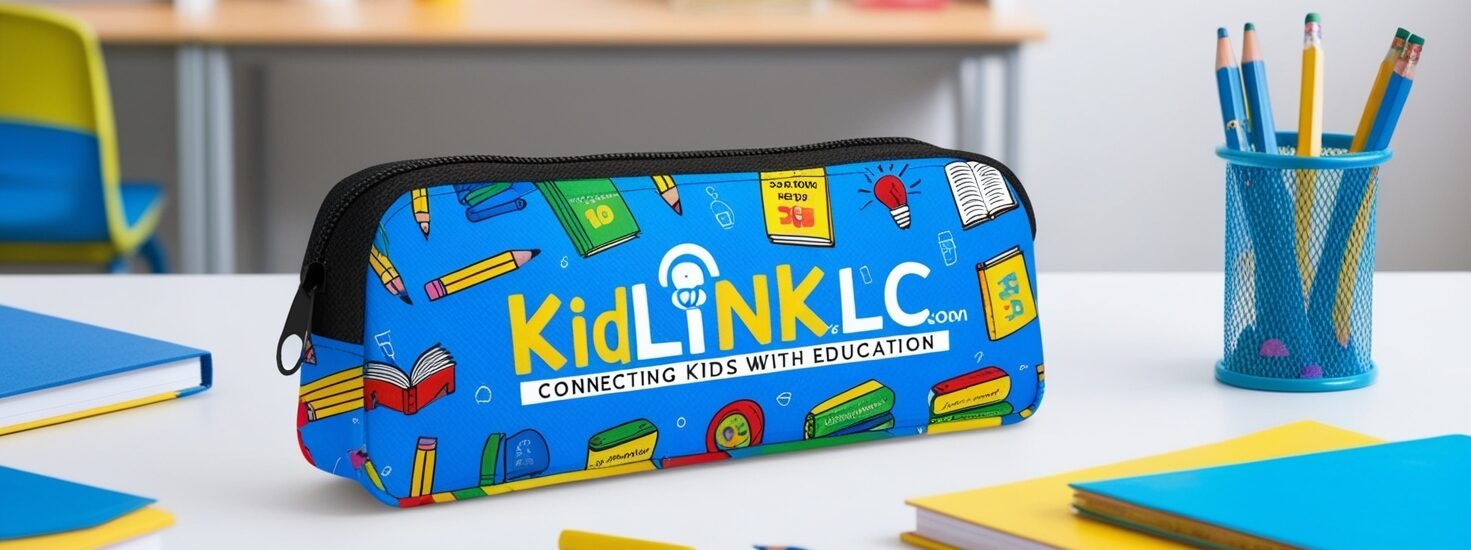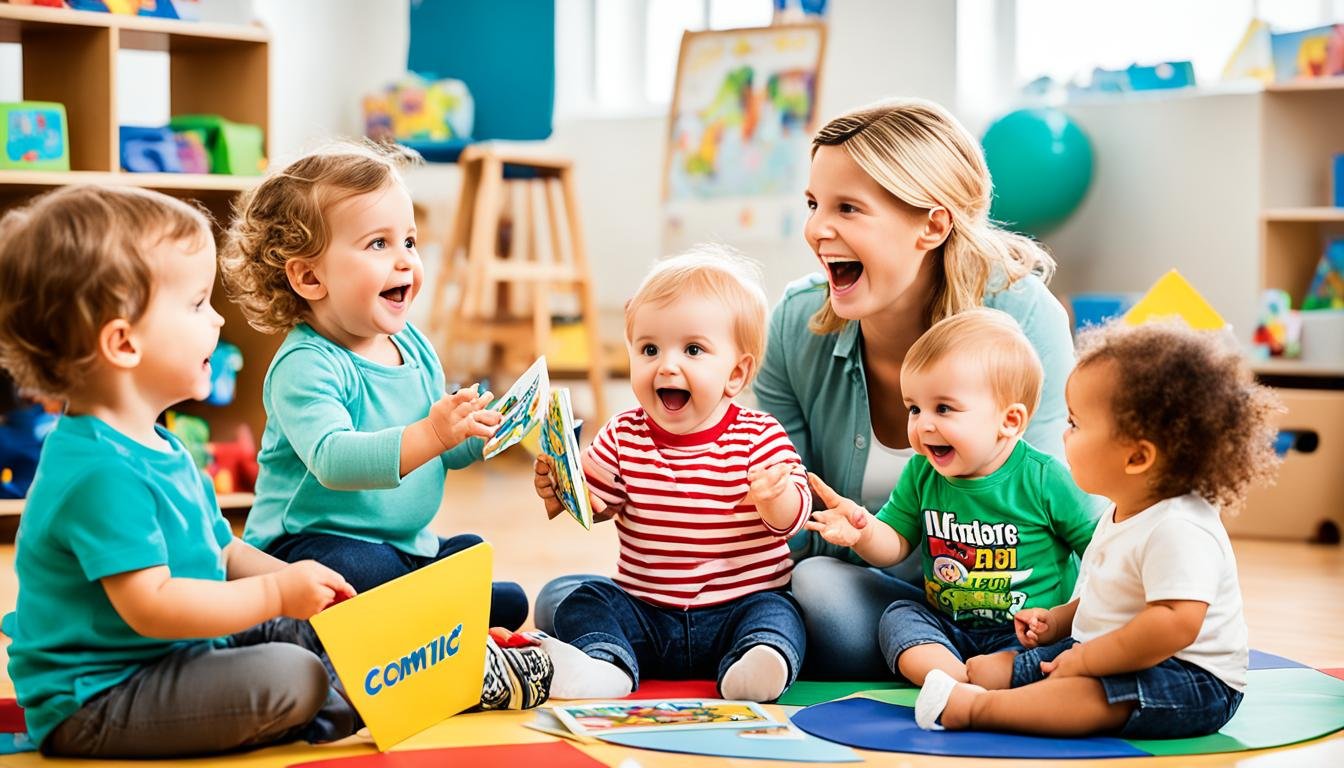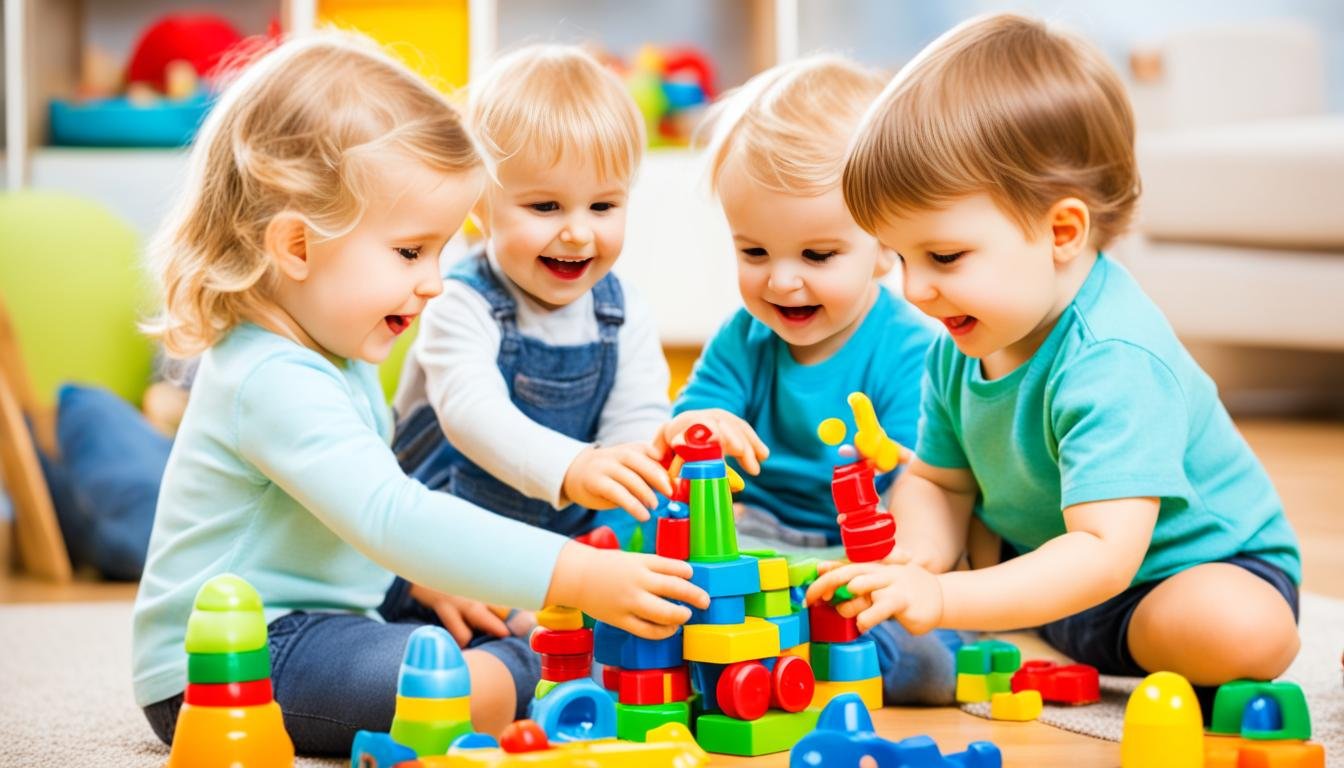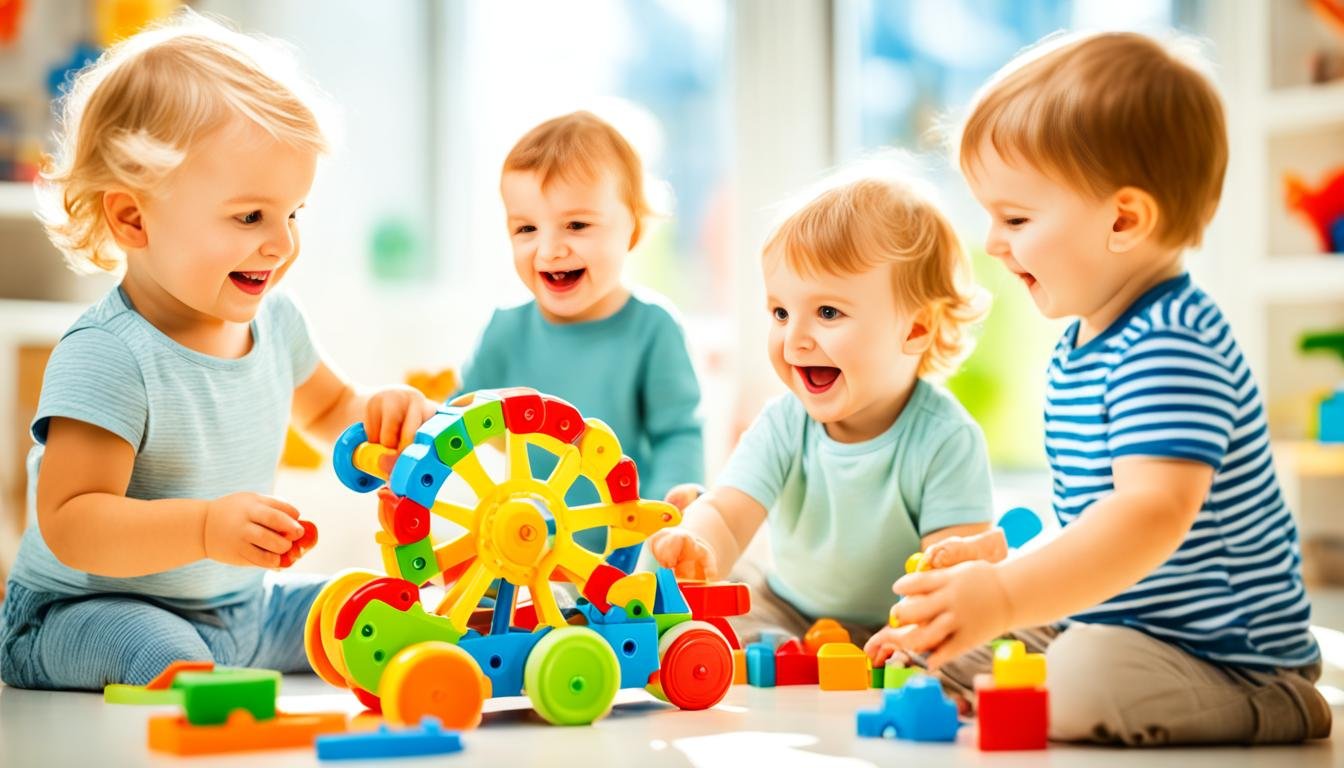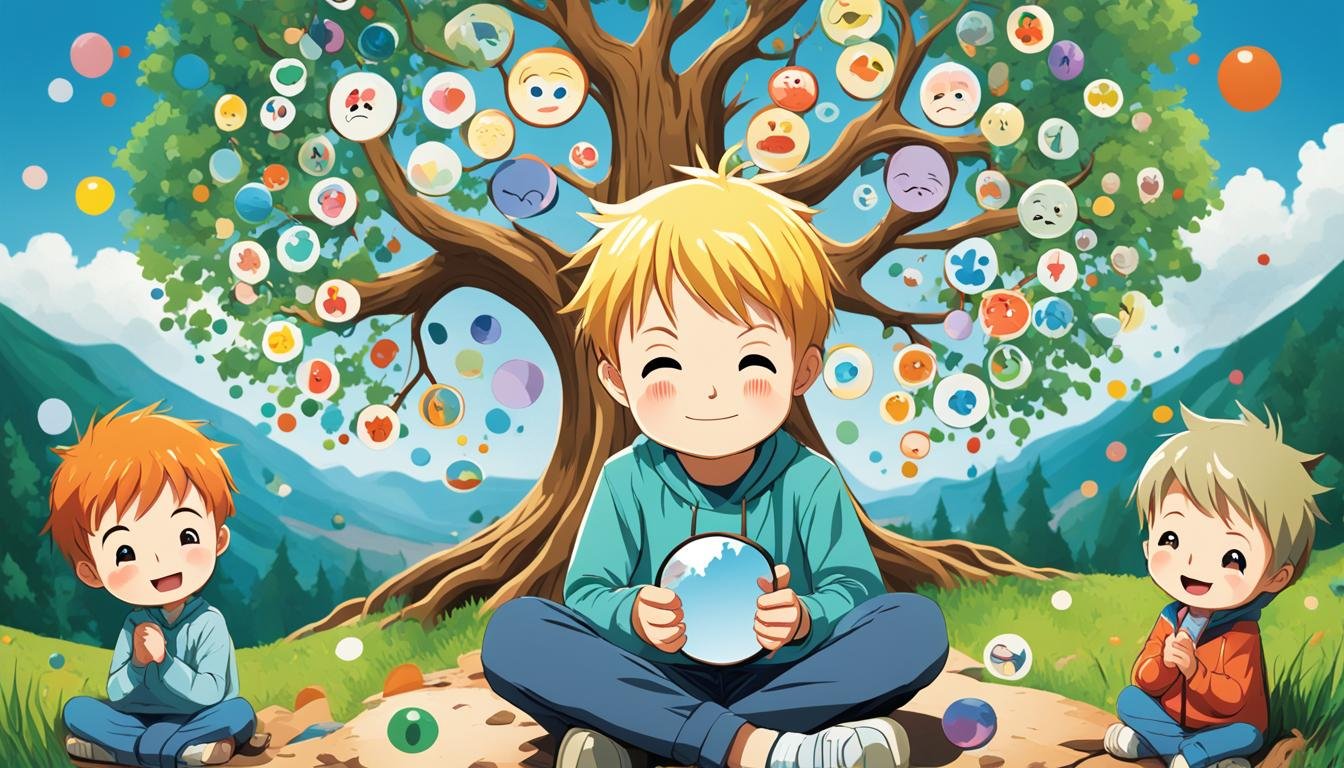What Are the Most Effective Strategies to Encourage Early Language Development in Toddlers?
Have you ever wondered why some toddlers pick up language skills easily while others find it hard? The journey of learning language is interesting, and knowing how to help toddlers start speaking early is key. As a parent, I’ve learned that helping toddlers talk is crucial for their growth. In this article, I’ll share ways parents and caregivers can help their children talk and communicate better. By using these strategies, we can help our toddlers do well in the future.
Key Takeaways
- Understanding the critical role of parental involvement in language development.
- Exploring strategies that foster effective communication techniques.
- Recognizing the different stages of language acquisition in toddlers.
- Utilizing everyday routines to enhance language learning opportunities.
- Encouraging imaginative play as a tool for language growth.
- Identifying when to seek professional help for speech delays.
Understanding Early Language Development
Early language development is key to how kids share their thoughts and feelings. It includes phonetics, semantics, syntax, and pragmatics. These parts help kids learn language.
Phonetics is about the sounds of speech. Kids learn to tell sounds apart, which helps them build a vocabulary. Semantics teaches them about word meanings and how words connect.
Syntax is about sentence structure. Kids learn to put words together to share their thoughts. Pragmatics is about using language in social situations. It helps kids talk well with others.
Reading to kids and talking with them boosts their language skills early on. It lays the groundwork for their language abilities. By creating a rich language environment, I can help kids love language and keep improving their skills.
Importance of Parent-Child Interaction
Talking with my child is key to improving their language skills. It’s a vital way to build their vocabulary. By using everyday moments, I can teach them new words and ideas.
Building a Strong Foundation for Language Skills
Talking often with my child boosts their vocabulary and language understanding. Studies show that kids who talk more have better language skills. This early talk helps my child grow and prepares them for the future.
Simple chats and fun conversations make language exciting. This love for words is crucial for how they’ll communicate later on.
Impact of Parental Engagement on Developmental Milestones
Being involved in my child’s early language development is important. It helps them share their thoughts and explore ideas. Research says kids do better when parents talk, read, and listen to them often.
These early talks help my child learn and feel confident. They lead to better language skills as they get older.
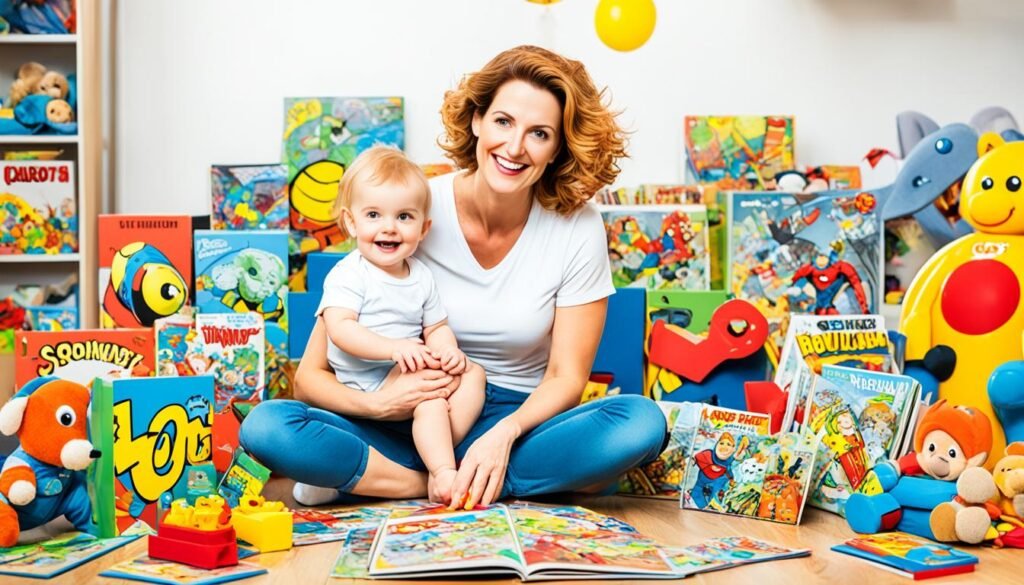
Recognizing the Stages of Language Acquisition
Understanding the stages of language acquisition helps us support our little ones well. Each stage shows important language milestones for babies as they grow in their early communication skills. Seeing these stages, I can see the exciting changes in my child’s ability to speak.
Infancy: Cooing and Babbling
At the start of life, babies start their language journey with cooing and babbling. I saw my baby make different sounds, trying out their voice. This early time is key, setting the base for speech development milestones. Playing with my baby helps them get better at making sounds.
18 Months to 2 Years: First Words
When my child is around 18 months old, hearing their first words is thrilling. This marks a big step from just making sounds to real language. Their vocabulary grows, showing big language milestones for babies. I help this by naming things and repeating words with my child every day.
3 to 4 Years: Simple Sentences
By ages three to four, my child starts making simple sentences. They use words to share their thoughts, needs, and feelings. This stage is a big step in thinking and shows important speech development milestones. Talking with my child helps them keep improving their language skills and confidence.
Strategies to Encourage Early Language Development
To help toddlers develop language skills, we need to be intentional and creative. Using several strategies can boost their language skills and communication abilities.
Imitating and Expanding Vocabulary
Imitating my child’s sounds and words is a great way to support their language skills. When I respond to them, I show the beauty of conversation. Adding longer sentences helps expand their vocabulary and deepen their understanding.
Using Gestures and Nonverbal Communication
Combining gestures with words makes communication clearer. I use gestures like waving or pointing to help my child understand. This method uses language stimulation techniques that cater to different learning styles, making it easier for them to grasp concepts.
Encouraging Symbolic Play
Symbolic play is key for language growth. I encourage my child to pretend, like turning a block into a car. This not only makes learning fun but also boosts their language skills as they tell stories about their play. Such activities spark curiosity and lay a strong base for future communication.
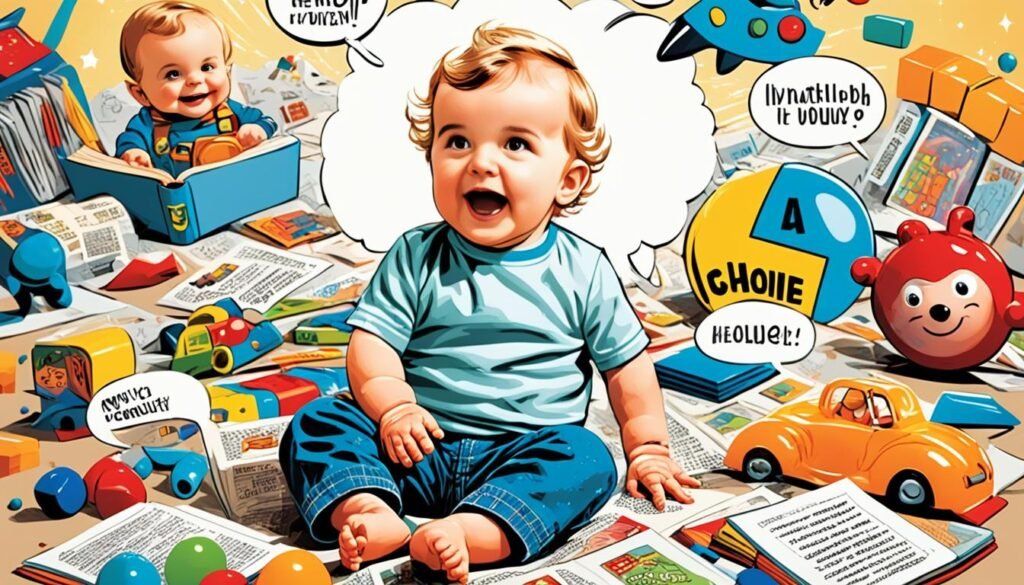
| Strategy | Benefits |
|---|---|
| Imitating Sounds | Encourages verbal attempts and acknowledges their efforts. |
| Expanding Vocabulary | Introduces new concepts and enhances cognitive development. |
| Using Gestures | Clarifies meaning and aids in comprehension. |
| Encouraging Symbolic Play | Fosters creativity and reinforces language through context. |
Language Stimulation Activities for Toddlers
Playing with words is key to helping toddlers learn early on. These activities keep them interested and make learning fun. By reading together, singing, and making a world full of words, I can boost my child’s talking skills.
Interactive Reading and Storytelling
Interactive reading is great for growing language skills. When I read to my toddler, I ask questions and let them guess what comes next. This makes reading a fun chat, deepening their connection to the story.
I pick books with bright pictures and exciting stories. These books spark their imagination and lead to more talking.
Playful Singing and Rhymes
Singing songs and reciting rhymes is a fun way to boost language skills. Songs and rhymes help toddlers remember words better. Adding actions to the songs makes them more fun and memorable.
Creating a Language-Rich Environment
Creating a world full of words is key for language growth. I fill my child’s space with new words through labels, art, and talks. Activities that get them talking, like naming things during play, help a lot.
| Activity | Description | Benefits |
|---|---|---|
| Interactive Reading | Engaging with books by asking questions | Enhances comprehension and vocabulary |
| Singing Rhymes | Using fun melodies and movements | Improves memory and pronunciation |
| Language-Rich Environment | Surrounding with words and conversations | Encourages exploration and experimentation |
How Imaginative Play Supports Language Growth
Imaginative play is key for supporting language development in young kids. When my kids play pretend, they start using language in new ways. This is important for their cognitive language growth. It makes learning new words and ideas fun and interactive.
Through pretend play, kids try out different roles. This helps them grow their fostering communication skills. For example, playing doctor or chef lets them use new words. It’s a fun way for them to share their thoughts and ideas.
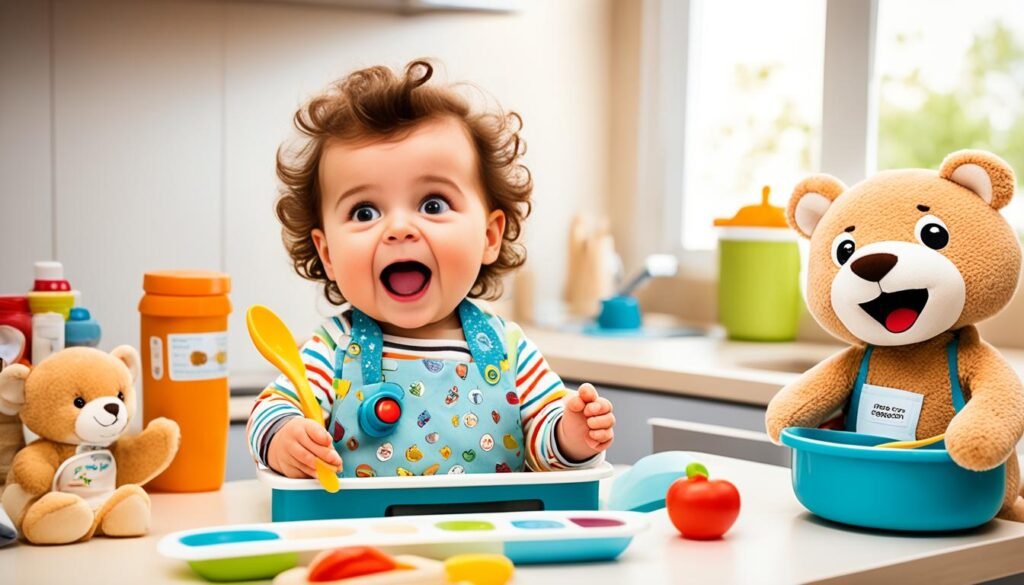
| Type of Imaginative Play | Language Skills Developed | Examples |
|---|---|---|
| Role-Playing | Vocabulary Expansion | Playing doctor, school, or family |
| Storytelling | Sentence Structure Understanding | Creating stories with toys or puppets |
| Creative Arts | Expressive Language | Drawing, painting, or crafting |
Imaginative play boosts vocabulary and sentence skills. It helps kids express themselves clearly. This approach to supporting language development sets the stage for strong communication skills later on. Adding this type of play to daily life turns it into a learning adventure, improving language skills.
For more tips on enriching learning for kids, visit KidLinkLC.com. It’s full of resources to spark young minds.
Engaging in Turn-Taking Activities
It’s key to get toddlers into turn-taking activities for their language growth. These activities help kids learn to talk back and forth, which boosts their speech and language skills. Adding these to daily life helps kids get better at talking to others.
The Role of Back-and-Forth Communication
Back-and-forth talking is crucial for kids to get good at language. When I talk with my child, I watch for their signals and follow them. This makes my child feel in charge, helping them want to talk more. Simple games like passing a ball or doing puzzles can turn into great chances for kids to learn and talk.
Creating Opportunities for Dialogue
There are chances to talk in our daily life. I try to make talking part of everyday tasks, like when I’m cooking or playing. Asking open-ended questions gets my toddler to share what they think and feel. This helps them talk better. For more tips on making kids talk more, check out the article on turn-taking activities.
| Activity | Back-and-Forth Interaction Example | Communication Skills Developed |
|---|---|---|
| Passing a Ball | Take turns passing the ball and naming colors or objects | Vocabulary expansion, turn-taking |
| Storytime | Ask questions about the story and let the child answer | Questioning skills, comprehension |
| Building Blocks | Build together and describe what you are creating | Descriptive language, collaboration |
Eliminating Negative Talk to Boost Confidence
Talking positively with toddlers is key to boosting their confidence. When kids hear negative words, it can make them feel confused and discouraged. This kind of talk doesn’t help them feel safe to speak up.
Creating a positive space helps kids talk more freely. Saying kind words makes my child feel important, boosting their confidence in sharing. Simple words like “I love how you shared that with me!” can really help their self-esteem.
I work on using only positive talk. When I correct my child, I do it in a helpful way. This builds trust and love for language. Turning negative talks into positive ones helps us grow together.
To help my child feel more confident, I celebrate their small wins every day. This builds a strong base for encouraging speech development. It lets them try out their language skills without fear of being judged. Being positive in our talks turns them into chances to learn and connect.
I hope others will try being more positive too. It really changes how well kids can talk and connect with us. For more on this, check out how positive language helps kids grow.
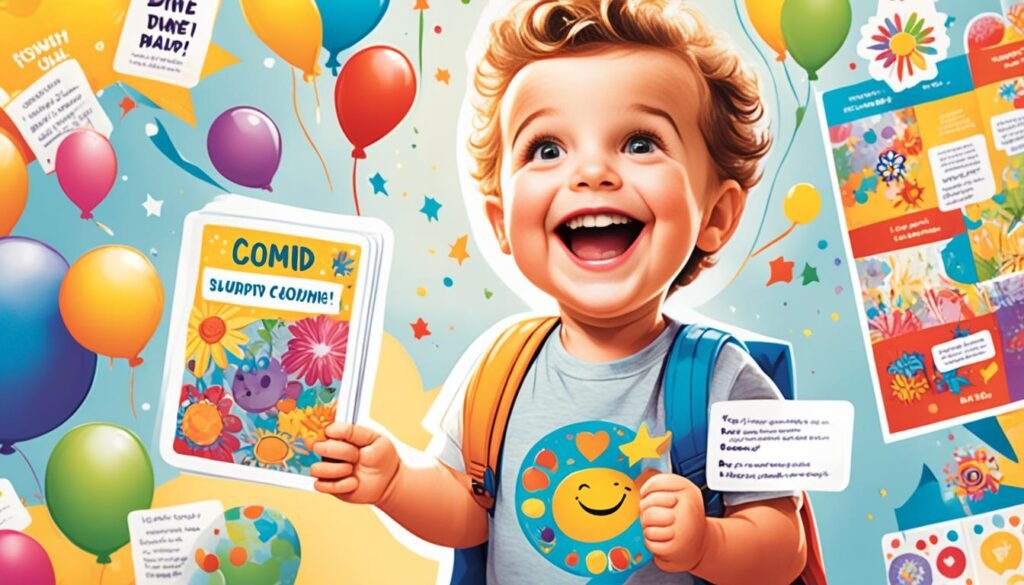
Recognizing and Supporting Developmental Milestones
It’s key to understand how language develops in toddlers to help them communicate better. Knowing the milestones helps me support my child’s growth. Some signs show typical language growth, while others might mean I should watch closely. Spotting delays early helps me know when speech therapy might be needed for my child.
Red Flags: When to Seek Speech Therapy for Toddlers
If my child shows any of these signs, it could mean they have language issues:
- Limited vocabulary for their age
- Difficulty in following simple directions
- Reduced ability to engage in back-and-forth conversations
- Challenges in pronouncing words clearly
- Avoiding social interactions and play
These signs mean I should look closer at my child’s communication skills. Early help is key for speech problems. I find resources helpful for spotting language issues here. Getting advice from a speech therapist can really help my child’s language skills. Working with experts helps me support my child’s growth.
Encouraging Language through Everyday Routines
Adding language learning to daily routines helps toddlers improve their communication skills. Using everyday activities makes learning fun and strengthens family bonds. This approach makes language learning a natural part of life.
Integrating Language Learning into Daily Activities
Adding language to daily tasks like meals or errands helps my child learn new words in real situations. For example, talking about food colors and shapes makes our conversations richer. This way, I make learning a part of everyday life.
Shopping trips become fun learning experiences by naming items and explaining their uses. We can talk about textures and tastes, making language learning exciting.
Using Descriptive Language During Playtime
Playtime is a great chance to use descriptive language in play. While building blocks or playing make-believe, I use different words and descriptions. Saying, “Let’s stack these colorful blocks to make a tall tower!” makes our play more engaging.
This encourages my toddler to talk more and creates a fun learning environment. It shows how easy it is to integrate language learning into play.
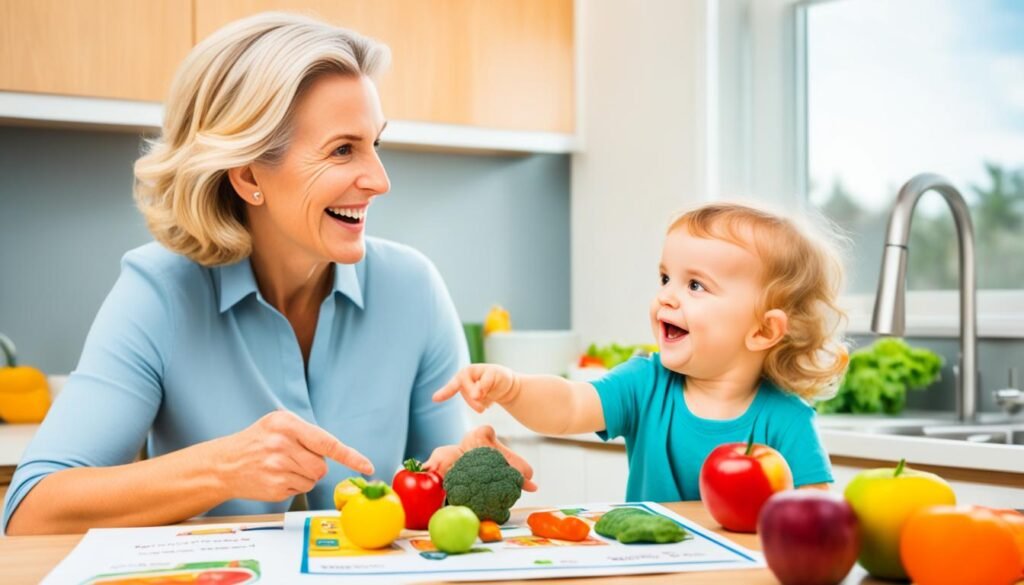
Promoting Communication Skills through Open-Ended Questions
Using open-ended questions with toddlers helps them share their thoughts and feelings. These questions make them think more and talk in a deeper way. They help kids get better at talking and thinking critically.
For instance, asking “What was your favorite part of the story?” gets them to talk more. It helps with their speech and makes them more creative and use more words.
Here are some speech development tips for using open-ended questions well:
- Use prompts that start with “What do you think about…” or “Can you tell me more about…”
- Encourage storytelling by asking, “How did that make you feel?”
- When they play, use questions like “What happens next in your game?”
Adding these tips to daily talks helps encourage language use naturally. With regular practice, I’ve seen big improvements in my toddler’s talking skills. Open-ended questions are a key tool in helping their language grow.
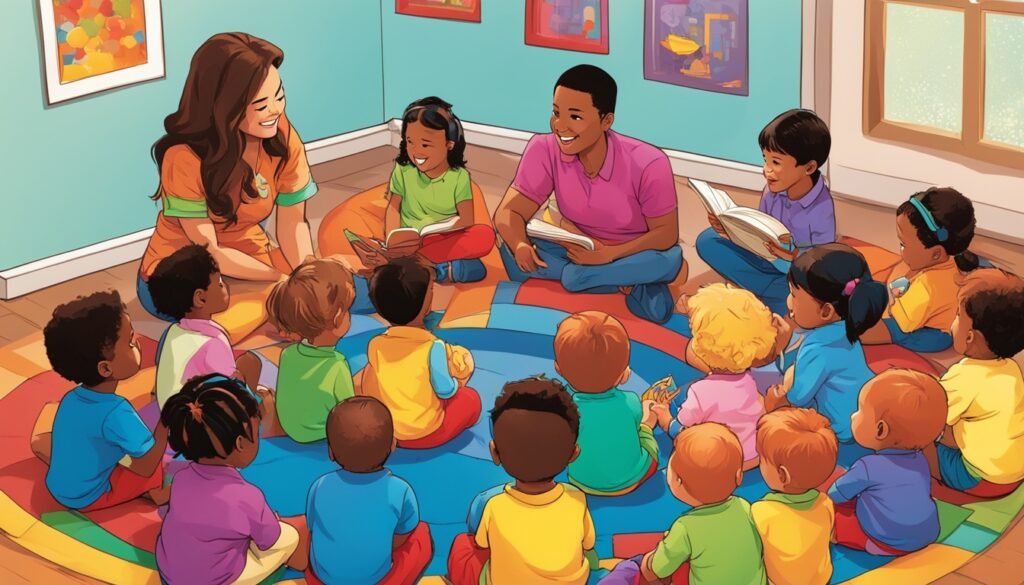
| Type of Question | Example | Benefits |
|---|---|---|
| Descriptive | “What do you see in the picture?” | Enhances observation skills and vocabulary. |
| Imaginative | “If you were a superhero, what would your powers be?” | Promotes creativity and storytelling. |
| Comparative | “How is this toy different from the other one?” | Encourages critical thinking and comparison. |
Forming Connections between Printed and Spoken Words
Connecting printed and spoken words is key for toddlers learning language. It helps them grow their vocabulary and get better at reading. Caregivers can make learning fun and effective by using smart strategies.
Pointing Out Words in Books and Labels
Pointing out words in books and labels is a great way to help. When I read to my child, I highlight words to help them recognize and understand. Labels on things at home also help with reading skills.
This makes kids link spoken and written words together.
Creating Personalized Books for Your Child
Creating books just for your child is another good idea. Using photos and stories about their life makes reading fun and meaningful. It helps them see the link between words they hear and read.
Personalized books make reading fun and help with language skills. Kids remember words that relate to their own lives better.
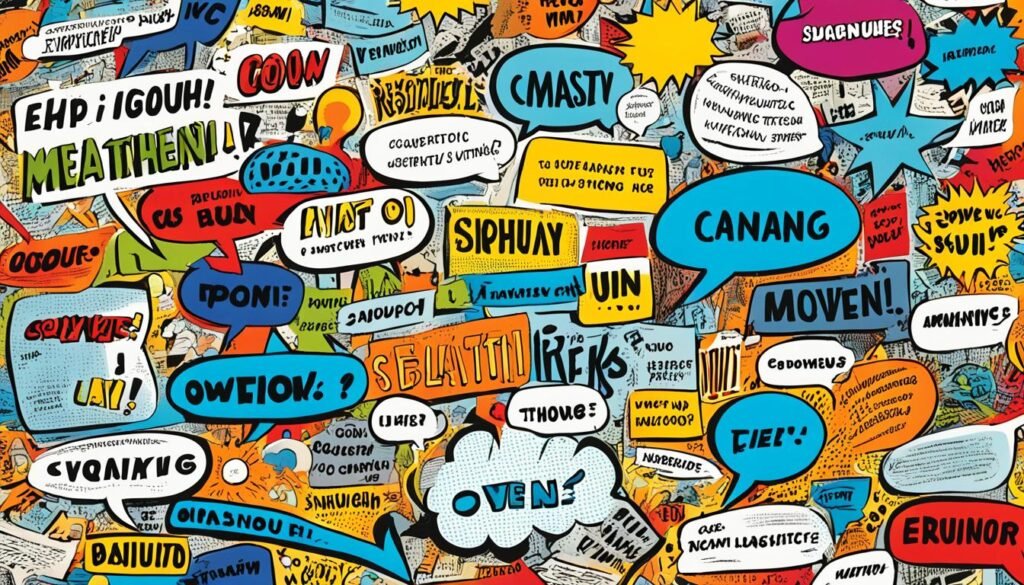
These methods are key for helping toddlers with reading. They help kids understand language better by using both spoken and written words. For more tips on teaching language and resources, check out the terms of use on our website.
Balancing Praise and Encouragement
When we help young children learn to talk, it’s key to praise and encourage them right. Positive words motivate them to keep trying. Using specific praise helps them know what they did right and keeps them wanting to talk more.
This way, they learn to express themselves better. It makes their language skills stronger.
The Importance of Labeled Praise
Labeled praise is when we point out specific things they did well. For example, saying, “I love how you said ‘apple’ when talking about your snack.” This makes it clear what we’re praising. It builds their confidence and helps them understand language better.
This kind of praise is crucial for helping kids communicate well.
Encouraging Attempts to Communicate
It’s important to encourage kids to keep trying to talk. I make sure they feel safe sharing their thoughts and ideas, even if they’re not clear. Simple actions like waiting for them to respond or saying “That’s right” help a lot.
These actions make them want to talk more. It shows that every word they say is important for learning to talk better.
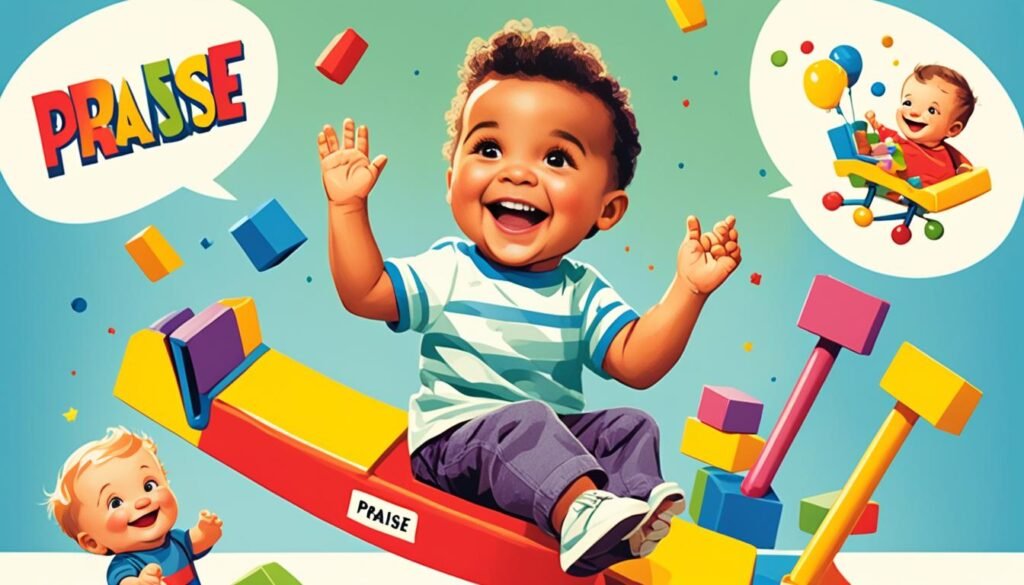
Identifying the Need for Speech Therapy
It’s important for parents and caregivers to spot speech disorders in toddlers early. If a child has trouble communicating, it could mean they need help. Catching these issues early can make a big difference in their future.
Common Signs of Speech Disorders in Toddlers
It’s key to watch for speech disorders early. Look out for these signs:
- Limited verbal communication or reliance on gestures
- Unintelligible speech or unclear articulation
- Difficulty following instructions or responding to questions
- Struggles with vocabulary development compared to peers
- Frustration during attempts to communicate
These signs might mean a child needs speech therapy. Spotting them early is crucial.
How Early Intervention Can Help
Starting early can really help a child’s language and communication. Working with a speech-language pathologist (SLP) can make a big difference. They create special programs for each child to help them learn to talk better.
Getting involved at home helps too. It gives kids a chance to practice their new skills in real life. Early help can boost a child’s confidence and help them do well in school and with friends.
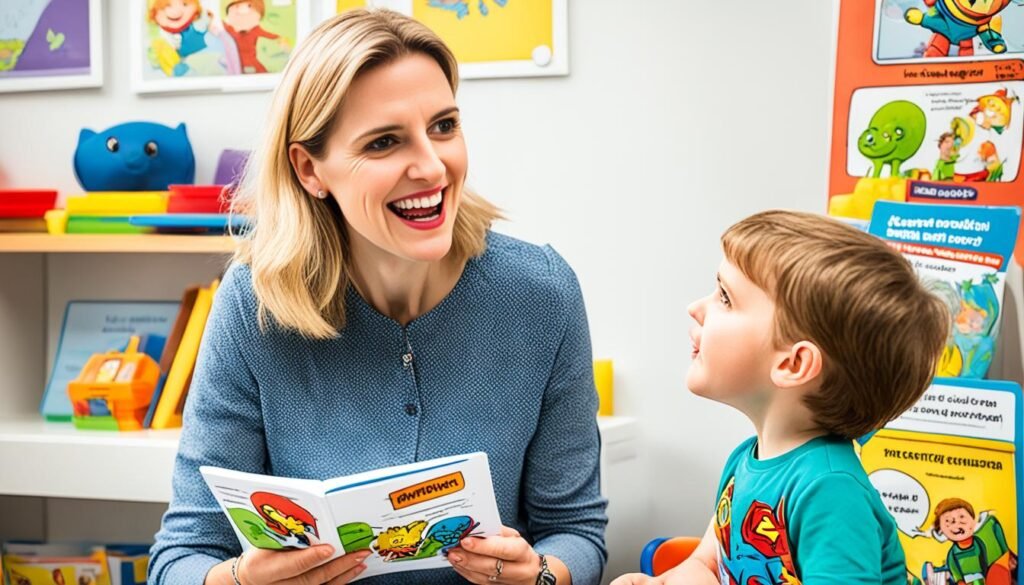
Using Technology Mindfully to Support Language Learning
In today’s digital age, mindful technology use can really help toddlers learn new words. It’s important to pick the right educational apps for toddlers. These apps should have fun language development activities. This way, they learn more words and understand better.
Using technology and language learning together can make learning fun. Digital tools can help kids talk more when used with regular learning. Apps that make kids listen and speak can make learning more exciting.
It’s key to balance screen time with real-life talks. Parents and caregivers should make sure tech doesn’t replace talking to each other. Reading or telling stories together is still very important. Mixing tech with old-school methods helps kids learn languages better.
| Type of App | Focus Area | Benefits |
|---|---|---|
| Interactive Reading Apps | Reading Comprehension | Enhances vocabulary and storytelling skills |
| Speech Recognition Apps | Pronunciation and Vocabulary | Encourages correct pronunciation and vocabulary enhancement |
| Language Games | Listening and Speaking | Promotes engagement while developing language skills |
For more tips on helping kids learn language, check out this helpful guide at supporting language development. By using technology wisely, I can make a great place for kids to learn new words. This way, they get to enjoy mindful technology use and grow in language skills.
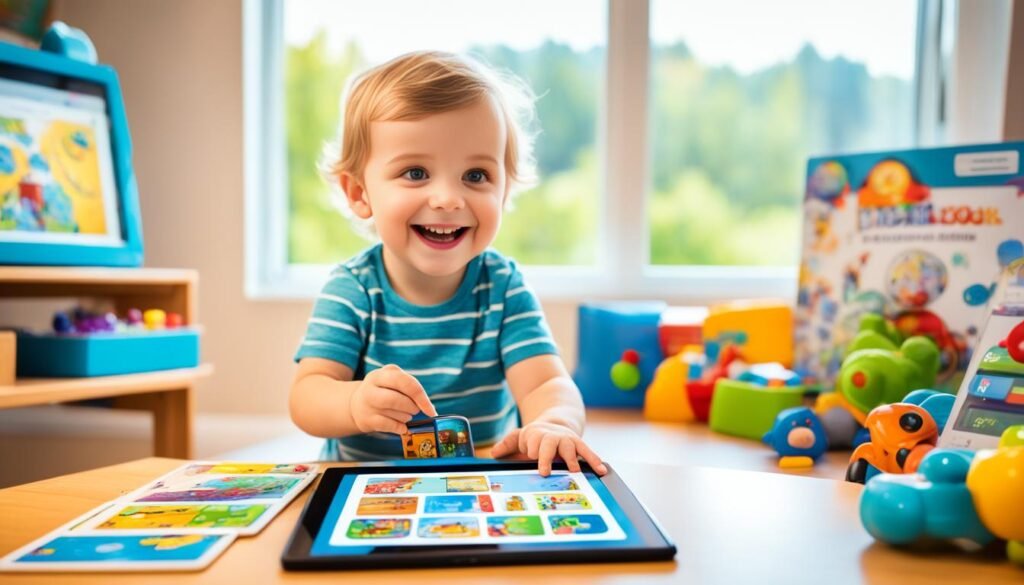
Building a Support Network for Language Development
Creating a strong support network is key for toddlers learning to communicate. Community resources are crucial in boosting language skills. They give parents tools to help their kids talk better.
Parents are key in helping kids grow their language skills. Working with other parents and caregivers is beneficial. It lets us share tips and find new resources for our children.
Connecting with local groups like libraries or early childhood centers is also important. These places often have workshops and programs for young kids. Joining in helps improve communication skills and builds community.
It’s important to use all the resources available. A strong support network makes learning better for my child. By connecting with others, I see how we all help shape our toddlers’ language skills.

Conclusion
As we finish discussing how to help toddlers start speaking, let’s remember the key strategies we talked about. We learned how to spot the stages of language growth and how daily activities help. These methods make it easier for toddlers to talk and communicate better.
Playing, reading, and talking with our kids are key to growing their vocabulary and confidence. These activities help with communication now and later on. They make learning and making friends easier for them.
Our time with our kids is crucial for their language skills. We help them express their thoughts and feelings. By focusing on these strategies, we help them be happy and successful. We give them the tools they need to talk well into the future.
